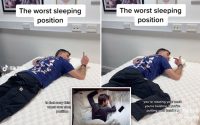Living alone leads to cognitive decline: study
Living alone is putting the lives of 1 in 4 Americans at risk, according to new research published Friday in the Journal of the American Medical Association Network Open.
Researchers at the University of California San Francisco found that the estimated 25% of US citizens who have dementia or other mild cognitive impairments are in danger of mixing up medications, unsafe driving, wandering outside the home and even forgetting medical appointments.
Study authors concluded that the health system in the United States is “poorly equipped” to serve people living alone who suffer from some form of cognitive decline.
“For these patients, living alone is a social determinant of health with an impact as profound as poverty, racism and low education,” said lead author Dr. Elena Portacolone, of the UCSF Institute for Health and Aging and the Philip R. Lee Institute for Health Policy Studies, in a statement.
Also, as this population group ages, the numbers will only continue to increase in a situation they likened to “sending a kid out to play on the freeway.”

When conducting the study, researchers interviewed 76 health-care providers, including physicians, nurses, home care workers, and social workers, among others. These interviewees worked in “memory clinics, home care services and social services” located in California, Michigan and Texas.
Many providers raised concerns about their patients who lived alone, as some of them could not remember why certain appointments were made, or did not answer follow-up phone calls.
Some didn’t even have an emergency contact listed on their charts, didn’t have a friend to call in a crisis or were unable to fill in missing medical information or paperwork.

This makes some patients increasingly “vulnerable to falling off the radar,” and makes it so that doctors are unable to understand how quickly some patients were declining.
These same patients were also “at risk for untreated medical conditions, self-neglect, malnutrition and falls,” according to the medical personnel.
One provider recalled having to send a client home with just a taxi voucher, which they compared to letting kids play in a busy street. Others were let out of the hospital without having a “support system in place.”
According to Portacolone, the study’s findings are indicative of the nation’s health-care system, which “fails to provide subsidized home care aides for all but the lowest-income patients.”
“In the United States, an estimated 79% of people with cognitive decline have an income that is not low enough to make them eligible for Medicaid subsidized home care aides in long-term care,” she said, explaining that the highest allowance for a person living alone in California is $20,121 per year.
Medicare is available to adults over age 65, but having a subsidized home aide is typically only provided to those who have had an “acute episode,” like a hospitalization.

“In an era when Medicare is going to spend millions of dollars for newly approved drugs with very marginal benefits, we need to remember that Medicare and other payers refuse to pay far less money to provide necessary supports for vulnerable people with dementia,” said senior author Dr, Kenneth Covinsky of the UCSF Division of Geriatrics.
This is not the first study conducted about the effects that being alone can take on a person.
In July, a study out of Tulane University found that being lonely can prove to be worse than some health issues like depression and smoking for patients with diabetes.
Meanwhile, in June, new research from the American Cancer Society found that there could be a link between cancer survival rates and those with a strong group of people around them.


